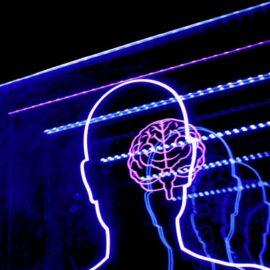
This is a free excerpt from one of Shortform’s Articles. We give you all the important information you need to know about current events and more.
Don't miss out on the whole story. Sign up for a free trial here .
What’s causing the anti-science movement? Why is there a widespread distrust of science recently?
In recent years, an anti-science movement of hostility toward scientific institutions has spread around the globe. In response, an equally fervent pro-science movement has sprung up.
Read on to learn why science has become controversial and what’s causing the anti-science movement.
Why Anti-Science Is on the Rise
Public trust of mainstream science has plummeted in recent years. According to polls, only 29% of Americans say they have a “great deal” of confidence in scientists, a drop from the 39% who expressed confidence at the beginning of the Covid-19 pandemic. This anti-science movement has provoked a pro-science reaction, too. Challenges to scientific consensus have been rebuked with calls to “listen to the science” and accept the wisdom of established scientific authorities. This conflict has grown into an ideological war.
Conspiracy theories that portray mainstream scientific institutions as part of a malevolent ruling class have gained widespread traction, including the idea that the coronavirus outbreak was orchestrated by elites. Such theories have sparked an unprecedented wave of harassment against individual scientists, from online insults to public, physical abuse.
Objectivity is at the heart of science. The purpose of the scientific method—observation, experimentation, and verification—is to pinpoint as much objective truth about the world as possible. Why then, has it become so difficult for people to agree on the facts? Why are people so polarized in their attitudes toward science?
Reason #1: Humans Are Naturally Polarized by Everything
What’s fueling the anti-science movement? One major reason that science is so polarizing is that humans are naturally wired to form strong opinions but have trouble finding common ground with those who disagree.
Confirmation Bias Polarizes Us
First, our brains are wired with a “confirmation bias” that causes us to avoid information that challenges our existing beliefs. When our beliefs are challenged, we feel the kind of fear we would feel if our physical bodies were being threatened, and this “fight-or-flight” reflex pushes us to either flee from uncomfortable ideas (flight) or rationalize a counterargument and cling more tightly to our existing worldview (fight).
Consequently, when we analyze scientific evidence that has any room for interpretation, we typically cherry-pick whatever details and conclusions support our existing internal narratives. When researchers doing their due diligence acknowledge both the evidence that led them to their conclusions and evidence that fails to support their conclusions, both sides of any debate can use the researchers’ findings to strengthen their conviction in existing beliefs. When people who disagree become more convinced that they’re correct, they become more polarized.
Disagreements Over Objectivity Polarize Us
Second, we lack a shared definition of “objectivity.” If we could agree on what scientific data is objectively true, anyone could recognize when they’re refusing to accept an objective truth and easily overcome their confirmation bias. However, people with diametrically opposed worldviews often believe in their own objectivity while perceiving others as fundamentally biased.
For example, the field of medicine is currently entrenched in a debate over the role of racial awareness in hospitals. Some argue that modern medicine is tarnished by long-standing systemic racism responsible for the statistically greater risk and harm to minorities in the hospital system. To remedy this, they push for an open acknowledgment and a deep investigation of racism in medicine.
Reason #2: Two Sides Disagree on What Is Fueling Anti-Science
We’ve discussed why humans naturally cling tightly to their existing convictions once they divide into polarized camps. Beyond this, the explanation as to why science has become so polarized is a point of contention.
As we discussed earlier, polarization in science has been fueled by the rise of a passionate anti-science movement; however, people disagree on what is causing this increased hostility toward science. This second disagreement also results in increased polarization, and it marks a widening philosophical divide not only between those with radical attitudes regarding science, but also moderates.
One group blames the rise in anti-scientific ideology on the rampant spread of misinformation validated by irresponsible authority figures. The other group argues that mainstream institutions—science and news organizations—have fueled anti-science movements by betraying the public’s trust through politically biased and manipulative messaging.
This second conflict is particularly polarizing because each side’s solution to dangerous anti-science appears to the other side to be fueling the problem. Thus, these differences in opinion regarding science have been intensified by fear. To explain why this is, we first need to establish the assumptions held by each side.
Perspective #1: Misinformation Fuels Anti-Science
Some believe that viral scientific misinformation is the primary cause of the anti-science movement.
The drastic spike in misinformation is due in large part to the advent of the Internet. Global social media networks mean that any given idea has more potential to spread than ever before. Further, research shows that claims with no supporting evidence—often extreme, inflammatory claims—spread across social media just as easily (if not more easily) than well-supported facts.
Many people and groups have an incentive to invent and spread misinformation, including influencers looking to build an audience for profit, political figures looking to gain power by discrediting their opponents, and foreign governments looking to destabilize their enemies. The end result is an internet landscape defined by an overload of contradictory information that enables us to discover “evidence” for anything we want to be true (under the influence of confirmation bias).
Additionally, some in this camp argue that authority figures have fueled the rise of anti-scientific movements by irresponsibly validating scientific misinformation. For example, throughout the Covid-19 pandemic, conservative politicians downplayed the severity of the virus—Senator Marco Rubio, for one, posted a tweet calling the public response to the Omicron variant “irrational hysteria.” During the Trump administration, even the president regularly challenged scientific consensus—for instance, repeatedly announcing that the end of the pandemic was imminent even as White House scientists insisted on the opposite.
Perspective #2: Biased Mainstream Institutions Fuel Anti-Science
Some believe that biased mainstream institutions are the primary cause of anti-scientific fervor. According to this theory, scientific authorities are allowing their political ideology to take precedence over the objective science itself, suppressing dissenting opinions and discoveries that fail to support their political narratives. Additionally, they intentionally misrepresent the scientific consensus to achieve political ends.
For example, during the Covid-19 pandemic, skeptics of mainstream science harshly criticized Dr. Anthony Fauci, the most well-known public-facing scientific authority of the time, for colluding with mainstream news outlets to censor dissenting opinions from other scientists. When scientists from Harvard, Oxford, and Stanford proposed an alternative pandemic response plan called the Great Barrington Declaration, Fauci exchanged emails with colleague Dr. Francis Collins in which they planned to respond with a “quick and devastating public take down,” leading to a series of articles in publications like The Washington Post and Wired decrying the proposal as “fringe” and “dangerous.”
Additionally, skeptics criticized Fauci for distorting facts to manipulate the public into prosocial behavior—for instance, he admitted to deliberately raising over time his estimate of the number of Americans who would need to get vaccinated to achieve herd immunity, with the intent of providing a goal that would motivate as many people to get the shot as possible.
The Two Sides Advocate Mutually Exclusive Solutions
The conflict between these two contrasting perspectives is especially divisive because each side’s solution to the problem of dangerous anti-science appears to the other side to be making the problem worse.
Because they believe that anti-science movements are caused by rampant misinformation, the first group assumes that the solution is to stop the spread of misinformation. All authority figures should align with the scientific consensus and condemn dangerous misinformation campaigns, to provide a trustworthy united front that people on both sides of the political aisle can trust. However, to the second group, clinging to a preformed conclusion and condemning everything else as “misinformation” will only further degrade public trust.
Because they believe that anti-scientific movements are due to mainstream institutions that have compromised the public’s trust, the second group assumes that the solution is to keep politics out of science. Scientists should report their findings objectively and give due consideration to all dissenting arguments and evidence, to show the public that they can trust mainstream institutions to serve the people without pushing their own agenda. However, to the first group, such contrarian “objectivity” undercuts the credibility of established scientific authority and will further degrade public trust.
Compromise seems unlikely, as any concessions to the other side appear to help accelerate the deterioration of the world’s social fabric. A mutual fear of this fate has intensified the polarization around science.

Want to fast-track your learning? With Shortform, you’ll gain insights you won't find anywhere else .
Here's what you’ll get when you sign up for Shortform :
- Complicated ideas explained in simple and concise ways
- Smart analysis that connects what you’re reading to other key concepts
- Writing with zero fluff because we know how important your time is






